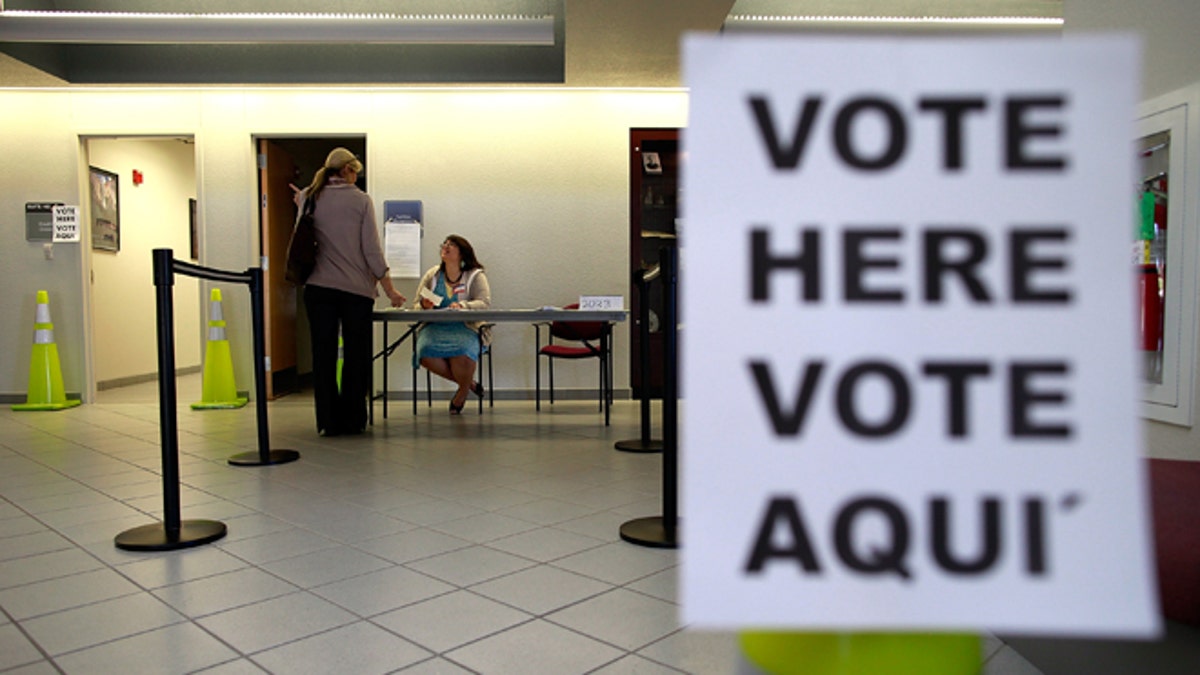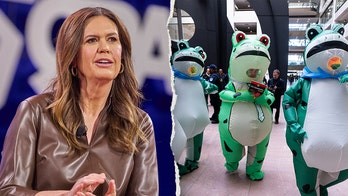
MANSFIELD, TX - NOVEMBER 06: An election official answers a question for a voter on November 6, 2012 in Mansfield, Texas. (Photo by Tom Pennington/Getty Images) (2012 Getty Images)
These midterm elections will see nine first-time Hispanic candidates for the House of Representatives.
One of the challenges they face is persuading fellow Latinos to go out and vote on Nov. 4.
First-time congressional candidate Norma Torres tells people in her Los Angeles-area district that there is no more critical time to vote than now, even as she acknowledges "great disillusion" may cause many Hispanics to sit out Election Day.
"There's nothing sexy on the ballot, no ballot measure to mobilize people" said Torres.
And no presidential contest this year.
She and fellow Democrat Christina Gagnier are in a race to succeed Democratic Rep. Gloria Negrete McLeod, who is quitting Capitol Hill after just one term and trying to win election to a county board of supervisors.
"My message is that now it's more important than ever that we vote to send a clear message to Washington that we are a big group of voters and they should pay attention to us," Torres said.
Another candidate running for office is Democrat Raul Garcia, a write-in candidate against Majority Leader Kevin McCarthy of California, the House's No. 2 Republican.
Elections in nonpresidential years typically draw fewer voters. How Hispanics respond in Tuesday's balloting could offer clues to the long-term political consequences of inaction on immigration policy and on increased deportations, issues that have dismayed Hispanics.
House Republicans refused to take up comprehensive immigration legislation that passed by a strong bipartisan vote in the Democratic-controlled Senate in June 2013. That bill would have granted a path to citizenship for immigrants living illegally in the U.S., tightened border security and expanded the number of visas for highly skilled workers.
After more than 2 million deportations, President Barack Obama said he would use executive power to enact immigration changes after Congress' summer recess. Obama later reversed course and promised action after Election Day.
First-time Republican candidate Carlos Curbelo, a son of Cuban exiles who is trying to unseat Democratic Rep. Joe Garcia of Florida, blames both parties for the failure on immigration. There is "deep disappointment" about it among Hispanic voters, Curbelo said, but "sometimes disappointment can encourage people to go and vote."
"I fear there will be a lack of participation, but my job is to try to fight that," said Ruben Gallego, a Democrat who is seeking Arizona's 7th Congressional District seat.
The National Association of Latino Elected and Appointed Officials predicted that almost 8 million of the nearly 25 million eligible Hispanic voters would go to the polls in November, compared with 6.6 million in the 2010 midterms.
Citing voter apathy, stricter ID laws and budget shortfalls, the National Council of La Raza scaled back to 120,000 its goal of registering 250,000 new Hispanic voters for the upcoming election, said Clarissa Martinez De Castro, deputy director of research.
Pete Aguilar, a Democrat running for an open California seat against Republican Paul Chabot, says Democrats could be hurt if Latino voters stay home. "We will make an effort so that all members of our community will go out and vote," Aguilar said.
Other first-time Hispanic Democrats are Amanda Renteria, daughter of Mexican day laborers who is running against Republican David Valadao for California's 21st District, and Roxanne "Rocky" Lara, who is trying to unseat Rep. Steve Pearce, a five-term Republican from New Mexico.
The GOP's first-timers were among 45 participants in its "Young Guns" program, which helped the GOP take 63 seats in 2010.
They include Alex Mooney, also the son of a Cuban exile. Mooney moved from Maryland to West Virginia, where he faces former state Democratic Party Chairman Nick Casey in the 2nd Congressional District.
Pedro Celis, who is trying to unseat Rep. Suzan DelBene, D-Wash., thinks his Mexican origin might help him win.
"I'm American by choice," said Celis, who is from Monterrey, Mexico, and became a U.S. citizen in 1993. "I came here as an adult, I wasn't brought by my parents. As far as I know, there's nobody with my background in Congress."
Marilinda Garcia, who is challenging Rep. Annie Kuster, D-N.H., said Hispanic voters ask her about the Senate-passed immigration bill.
"I am against amnesty, but giving legal status is a different thing, and there are different possible solutions," Garcia said.
Overall, there are 32 Hispanic members of Congress seeking re-election: 25 Democrats and seven Republicans.
There are no new Hispanic candidates in the Senate. Republican Marco Rubio of Florida, a possible presidential candidate, is up for re-election in 2016. Texas' Ted Cruz, also mentioned as a potential GOP presidential nominee, and Democrat Robert Menendez of New Jersey face re-election in 2018.
Mario H. Lopez, president of the Hispanic Leadership Fund, a conservative national advocacy organization that primarily backs Republicans, wrote in The Hill that elections in Colorado, New Hampshire and Florida will be particularly significant for Latinos.
He argues that while Republicans and Latinos may disagree on aspects of immigration, they share many values and that Latinos can play a vital role in how the GOP does in elections.
“There are three races that will impact the future of those issues that matter to main street Hispanics more than the many other contested races, and those are races where Hispanic voters and candidates can change history,” Lopez wrote. “Candidates in those races are: Cory Gardner (R) for Senate in Colorado; Marilinda Garcia (R) for Congress in New Hampshire; and Carlos Curbelo (R) for Congress in Florida.”
Based on reporting by The Associated Press.
Follow us on twitter.com/foxnewslatino
Like us at facebook.com/foxnewslatino











































